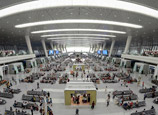
GENEVA, July 2 (Xinhua) -- A new report released Tuesday by an entity of the United Nations called for new strategies to cope with the impacts of rapid urbanization across the world, including increasing demands for energy, water, sanitation, public services, education and health.
The World Economic and Social Survey 2013, produced by the UN Department for Economic and Social Affairs, said that more than 6.25 billion people will be living in cities by 2050, and during the period from 2000 to 2050, developing regions could add 3.2 billion new urban residents.
The survey then stressed the urgency to address multiple sustainable development challenges given the rapid rate of urbanization, having cast light on three major challenges needed to be addressed in order to achieve sustainable development, namely food security, energy transformation and sustainable cities.
The survey called for ambitious, action-oriented sustainable development strategies to address the different levels of urban development, proposing that these strategies should aim at systematically changing consumption and production patterns.
Efforts on ensuring food security, energy transformation and sustainable development of cities, as underscored in the report, must build on new technologies.
It emphasized that economic and financial incentives for creating and adopting new technologies would require policy reforms including taxes and subsidies, as well as regulatory reforms, in order to achieve core targets relating to technology adaptation, the reduction of food waste and enhanced energy efficiency.
















 China's weekly story (2013 6.22-6.28)
China's weekly story (2013 6.22-6.28)


![]()
